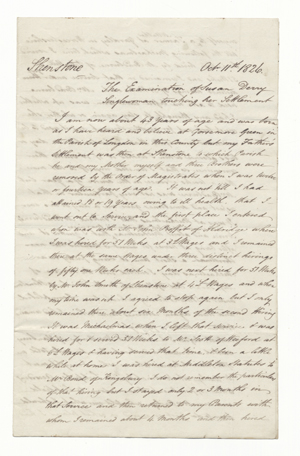
Archive sources
|
Hiring: a maidservant moves between a long sequence of employersAn extensive settlement certificate concerning a servant’s employment, 1826 (D34/A/PO/242). This document illustrates the self-hiring system for many domestic workers, particularly those working in smaller houses in the countryside or small towns. News of a new employment prospect might come from word-of-mouth, and the servant could choose to leave if the position did not suit or a better one arose. The term for hiring was always 51 weeks after which the balance owing on the year’s wage was paid, and a week’s “holiday” could be had before the next period of hiring. Strictly speaking the servant was not in employment for that week, but could leave personal possessions behind if expected to return. The employer would often keep a book of wages and the servant had to sign or make a mark that the outstanding balance of salary had been received. This annual hiring system had the effect of preventing a servant from gaining settlement in a parish through a whole years’ residence. This is the key to this long settlement examination. Susan or Susannah Derry worked as a kitchen maid in many different places, but never for more than 51 weeks at a time, although she always left her possessions until she moved to a new employer’s house. One of her employers comments that she has not made her “a parishioner”. Only the first three pages of the document are illustrated, but the complete text has been transcribed.
|
